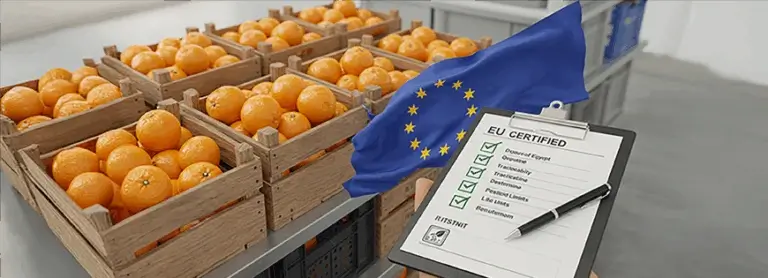Address
Work Hours
Monday to Friday: 7AM - 7PM
Weekend: 10AM - 5PM

Egyptian oranges are making serious waves in global trade—juicy, vibrant, and in high demand across Europe. But there’s one major hurdle that every exporter must clear before a single crate hits EU shores: certification.
If you’re looking to export Egyptian oranges to the EU, this comprehensive guide will walk you through everything you need to know—from phytosanitary certification to residue testing, labeling, and FAQs that demystify common concerns.
Egypt exported over 500,000 metric tons of oranges to Europe in 2023 alone, ranking it among the top orange exporters worldwide. The European Union offers high profitability for agricultural exports—but it also has some of the world’s strictest regulations.
That means if you want your Egyptian oranges stacked neatly on European grocery shelves, you need to follow the rules—every single one of them.
To gain entry into the EU market, your oranges must pass several important certification processes:
Maintaining a consistent cold chain is non-negotiable. From your packing house to the EU dock, temperature logs must show continuous refrigeration. Typically, orange shipments to Europe are kept between 3°C and 8°C.
Beyond compliance, EU importers prioritize:
Associations like the Egyptian Export Council for Agricultural Crops can provide exporter support, shared logistics, and easier access to global exhibitions. They often have direct ties with European buyers and regulators.
Once certified, you can proudly promote your oranges in Europe using value-driven selling points like:
Exporting Egyptian oranges to the EU is an exciting opportunity—but one that requires preparation, precision, and full regulatory compliance. With the right certifications, careful documentation, and a deep understanding of EU expectations, your oranges can become Europe’s next favorite winter citrus.
Need help getting started? PEI Trade is here to support exporters every step of the way—from certification consulting to packaging, logistics, and beyond. Let’s bring Egypt’s best to Europe, one orange at a time.
It typically takes 4–6 weeks from initial inspection to final certification, depending on your preparedness and the certifying body’s schedule.
Your shipment may be rejected at the EU port. You could also face a temporary export ban. Always pre-test and ensure pesticide compliance before shipment.
No, but it is highly recommended and often demanded by large European retailers. It adds credibility and can open more doors.
Costs vary depending on the certification body, size of operation, and number of tests. On average, budget between $3,000 and $8,000 for full certification, including lab tests and inspections.
In Egypt, recognized EU-aligned certifiers include SGS Egypt, ECOA, CERES, and Control Union.